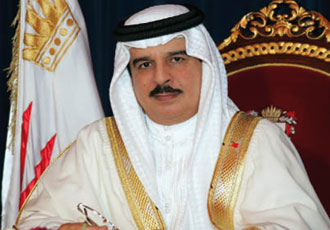
|
 |
 |
|
|
|
|
|
|
|
|
|
|
|
|
|
|
|
|
|
|
|
|
|
|
The King of Bahrain:Human rights crisis will not be repeated:
|
 |
One of the main political messages of the speech is the Government’s commitment to dialogue with the opposition. This is to take place without any foreign mediators as this issue is part of the country’s internal affairs. This implies that dialogue can only be achieved if the concerned parties are convinced of the importance of it as dialogue cannot be imposed from the outside. This can also be seen as a warning to regional and international parties that are seeking a dialogue which suits their own intere?t and objectives. The level of political maturity in the end is what will specify the time, subjects and outcome of the dialogue.
Major political crises can only be settled through dialogue, however, relying on foreign pressure constitutes an obstacle in that way. We hope that after more than a year of unrest in Bahrain, political parties have reached political maturity and are ready for dialogue for the sake of Bahrain. This should be achieved without foreign influence which will only prolong the crisis and reproduce it.
The second message relates to the repercussions of the crisis and was directed at the opposition, the Government and the general public. The King, reaffirmed that violence and human rights violations that took place in February 2011 will not be repeated as the past collective experience, losses and new awareness of the people will prevent this from happening again. Moreover, the speech highlighted that the process of reform is required and will continue, but it is going to be gradual and in accordance with the law and in line with the provisions of the Constitution. In addition to this, reform and security will only be achieved by respecting the Judiciary and human rights principles.
The third message is related to the social fabric and sectarianism which was the most dangerous outcome of the crisis as it tore the social fabric and disunited the society.
The Kings speech highlighted four points:
Firstly, political disagreements should not be allowed to prejudice the unity and the harmony of the society. In other words, political disagreements should remain among political parties. Political leaderships should not transform their disagreement into sectarian discourses because ultimately this will break down the foundation of the state, complicate political solutions and destroy trust amongst our people. The selfish interests of political parties must not prevail and cause social schism which requires years to heal.
Secondly, social initiatives should be encouraged in order to promote national unity and avoid violence and the incitement of hatred and sectarianism. The King urged civil society institutions, religious leaders, intellectuals and journalists to take an active and effective role in order to restore trust. He praised recent initiatives aiming at achieving social and national reconciliation. It is important for political disagreements to be confined to political parties and the general public recognize the priority of social co-existence.
Thirdly, restrictions on religious discourses should be introduced. The King demanded that the Ministry of Justice and Social Affairs fulfil its role in protecting religious discourses from being manipulated and should take more active measures in order to protect its noble message. This requires new legislations and putting into practice the existing laws; such as criminalising all forms of sectarianism.
Fourthly, promoting the role of the media is needed in order to preserve national unity and human rights culture, avoid sectarian discourse and allow more press freedom. For the media should be free from all sectarian, political and social polarisations. There is also a need for a modern press law which protects freedom of expression and outlaws any related breaches which could endanger national unity. We will not have a mature society which refuses sectarianism without having a free media which allows the free access to information, promotes transparency, spreads awareness and protects the rule of law and human rights.